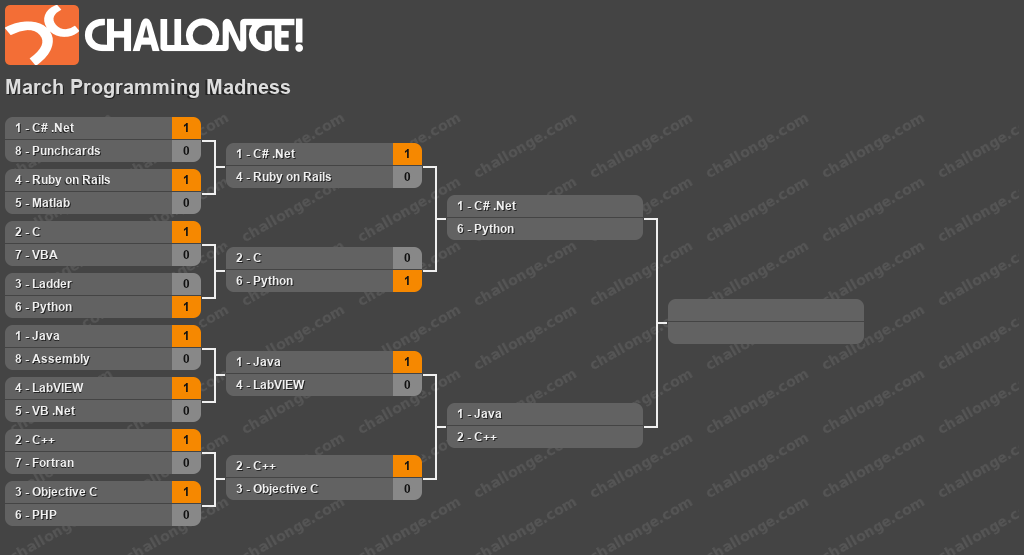Man time sure does fly. It seems like it was only a few weeks ago that I started a programming language competition in perfect synchronization with . Now that we are almost into the 3rd month after March though, I can only claim laziness, busy-ness, or an extravagant penchant for prolonging suspense as excuses for dragging this series out so long. For my own sake, I think I’ll take the last option. Regardless, we have seen a lot of shattered dreams and at least one magical Cinderella run (congratulation for strong nerd support and favorable matchups, Python.)
The tail end of round 2 graces us with the matchups between Java and LaVIEW and Objective C and C++. As we have seen before, Java is a widely used, extremely flexible, and free programming platform. Despite , Java is an integr������al part of the Android platform, which has only made Java more of a rockstar. The allow de�����velopers to focus on writing great applications, rather than get lost in memory allocation issues or tied up in painful debugging or code maintenance. Java has been (again, free!) meaning that there are numerous reusable libraries you can drop in when needed. On the flip side, LabVIEW is a language that is closely managed by its owner, National Instruments. In ways this can be a very good thing, since it avoids that can occur when . However, it has also meant that . LabVIEW is also the only on our list, meaning that it takes a different mindset than do the traditional C-like languages. This definitely has its uses, but it also can lead to silly mistakes and is prone to , and it just . As such, for the purposes of this competition, , I think that I will have to give Java the edge. If the competition had more to do with , though, it would definitely be another story.
Objective C and C++ is a much less differentiated matchup. Both languages were or in the 80’s as beefed up alternatives to C, specifically adding classes and object oriented design. However, they go about achieving this goal in entirely different ways. C++ uses what is called “” style, meaning that methods called on classes are all resolved at compile time. Objective C instead uses a messaging paradigm that is derived from its predecessor, . In this design pattern callers just blast messages out to classes who then resolve what to do on their side. This reminds me a lot of where the sender just broadcasts something and the receiver does what it wants, but there isn’t really any handshake between the two, so if the method doesn’t exist on the receiving side, the call just quietly dissolves into the ether. To me, this sounds prone to difficult debugging, and I am a huge proponent of enforcement. Without diving more deeply into������ Objective C, I am going to call it����� here and send Objective C home, and C++ on to the semi-finals.
Well, that’s it fo������r today, but we are getting closer and closer to crowning a champion. Honestly, I have to say that I would be happy to code all day in any of t���he languages we have left, but, in true DMC competitive fashion, one must be crowned the best!
See the Other Quarter Final Games
Check out the Conference Finals
